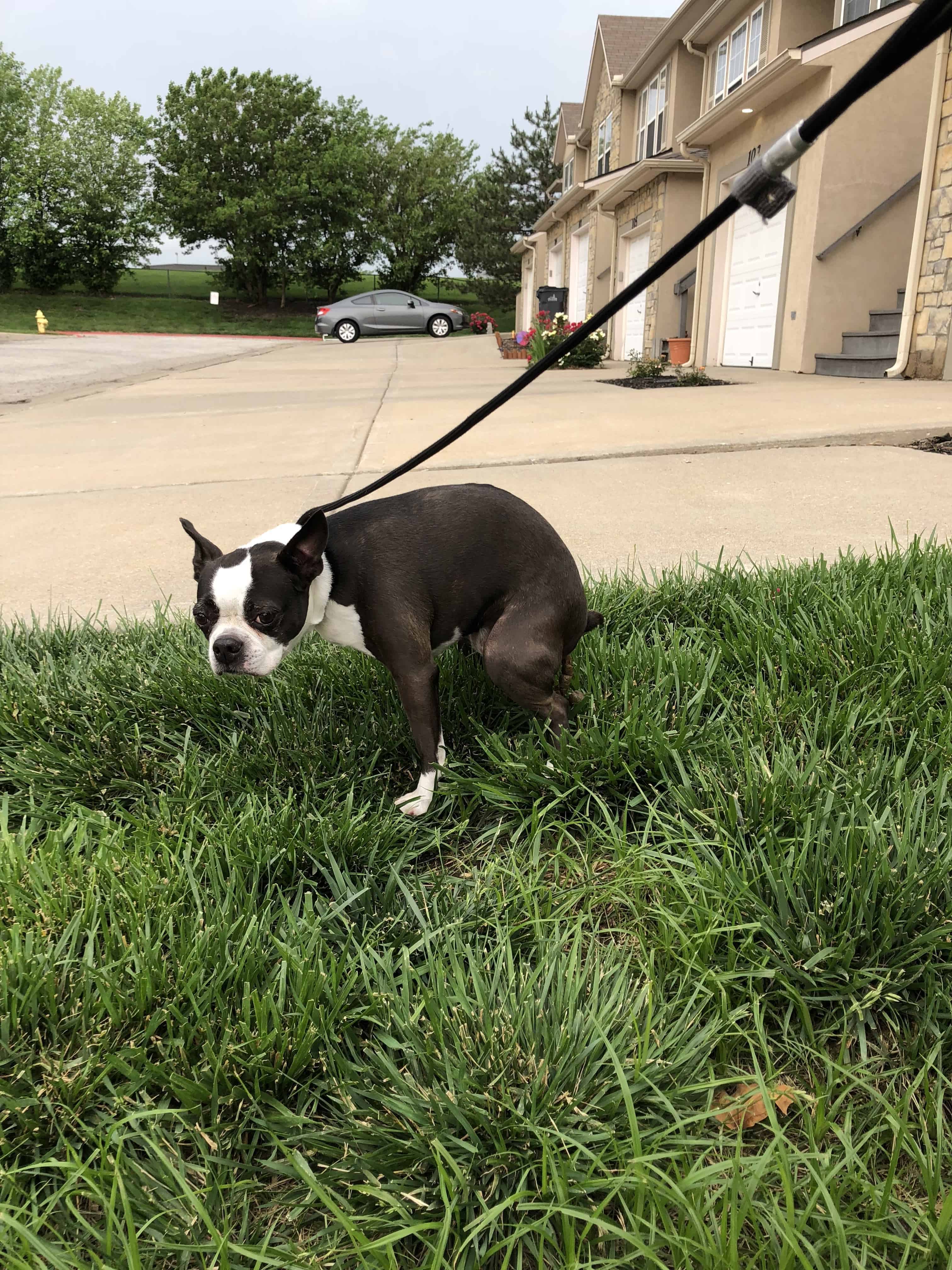If you’ve ever wondered about Boston Terriers and their bathroom habits, you’ve come to the right place! So, how often does a Boston Terrier need to pee? Let’s dig into this question and find out what the bathroom routine is like for these adorable dogs.
Now, I know you’re curious, but fret not! We’ll explore how frequently Boston Terriers need to relieve themselves, keeping in mind their unique needs and quirks. Keep reading to discover the inside scoop on this important aspect of caring for your furry friend.
So, grab a seat, get comfortable, and let’s dive into the world of a Boston Terrier’s potty schedule. You might just be surprised by what you learn!

How Often Does a Boston Terrier Need to Pee?
If you’re a proud owner of a Boston Terrier or considering getting one, you may be wondering how often they need to go to the bathroom. Proper potty training is essential for a happy and healthy pet, so understanding their needs is crucial. In this article, we will delve into the frequency at which Boston Terriers need to pee and provide you with helpful tips to ensure successful potty training.
The Biological Factors
Several biological factors influence how often a Boston Terrier needs to pee. One key element is their age. Puppies have smaller bladders, which means they need to relieve themselves more frequently. Typically, a young Boston Terrier will need to urinate every one to two hours. As they mature, their bladder capacity increases, and they can hold it for longer periods.
Another factor that affects their bathroom needs is their diet and hydration levels. If a Boston Terrier is consuming a lot of water or has a diet high in moisture, they will need to urinate more frequently. On the other hand, if they are not taking in enough fluids, their need to pee may be less frequent.
Additionally, individual Boston Terriers may have different bladder capacities and metabolic rates, which can influence their bathroom habits. Some may have smaller bladders or faster metabolism, leading to more frequent urination.
Potty Training Considerations
Proper potty training is essential to avoid accidents and maintain cleanliness in your home. Understanding your Boston Terrier’s bathroom needs and establishing a consistent routine is crucial for successful training. Here are some considerations to keep in mind:
- Establish a schedule: Create a regular bathroom schedule for your Boston Terrier. Take them outside first thing in the morning, after meals and playtime, before bedtime, and at regular intervals throughout the day. Consistency is key to reinforcing good habits.
- Observe signs of needing to go: Watch for signs that your Boston Terrier needs to pee, such as pacing, sniffing the ground, or circling. When you notice these behaviors, immediately take them to their designated potty area.
- Positive reinforcement: Praise and reward your Boston Terrier when they successfully eliminate in the desired area. This positive reinforcement will reinforce the behavior and encourage them to continue using their designated spot.
Tips for Successful Potty Training
Potty training can sometimes be challenging, but with patience and the right approach, it can be a smooth process. Here are some additional tips to help you successfully potty train your Boston Terrier:
- Be consistent: Stick to your established bathroom schedule and routine. Consistency is crucial to reinforce good habits and prevent confusion.
- Supervise closely: Keep a close eye on your Boston Terrier, especially during the initial stages of potty training. This will allow you to catch any accidents and quickly redirect them to the appropriate spot.
- Use a designated potty area: Designate a specific area in your yard for your Boston Terrier to eliminate. This will help them associate that spot with bathroom time and make training easier.
- Be patient and positive: Potty training takes time, so be patient with your Boston Terrier. Avoid punishment and instead focus on positive reinforcement and rewards for good behavior.
- Clean accidents properly: If your Boston Terrier has an accident indoors, clean it thoroughly with an enzymatic cleaner to remove any lingering smell. This will help prevent repeat accidents in the same area.
Common Mistakes to Avoid
While potty training your Boston Terrier, it’s important to be aware of common mistakes that can hinder the process. Avoiding these pitfalls can make training more effective and efficient:
Using punishment:
Punishment can create fear and anxiety in your Boston Terrier, leading to setbacks in potty training. Instead of punishment, focus on positive reinforcement and rewards for desired behavior.
Inconsistency:
Consistency is key in potty training. Inconsistencies in schedule or routines can confuse your Boston Terrier and make it harder for them to understand what you expect from them.
Ignoring accidents:
Ignoring accidents can send mixed signals to your Boston Terrier. It’s essential to address accidents promptly, clean them thoroughly, and redirect your pet to the appropriate spot.
Not giving enough opportunities:
Your Boston Terrier needs ample opportunities to go to the bathroom, especially during the early stages of potty training. Ensure you provide enough bathroom breaks throughout the day to increase their chances of success.
Not using positive reinforcement:
Positive reinforcement is a powerful tool in potty training. Rewarding your Boston Terrier for using their designated potty area will reinforce the behavior and make training more effective.
The Benefits of Successful Potty Training
Successful potty training not only ensures a clean and hygienic home but also strengthens the bond between you and your Boston Terrier. Here are some of the benefits:
Maintaining cleanliness:
Potty training allows you to maintain a clean and odor-free home by preventing accidents indoors. A trained Boston Terrier will understand where to go to the bathroom and limit their elimination to designated areas.
Better communication and understanding:
Through the potty training process, you and your Boston Terrier learn to communicate and understand each other better. This strengthens your bond and fosters a harmonious environment.
Peace of mind:
Knowing that your Boston Terrier has been successfully potty trained gives you peace of mind. You can trust that your pet understands where and when to go to the bathroom, reducing the chances of accidents.
Conclusion:
Potty training is an essential part of raising a Boston Terrier. By understanding their biological factors, establishing a consistent routine, and using positive reinforcement, you can successfully train your pet. Avoid common mistakes and enjoy the benefits of a well-trained Boston Terrier. With patience, persistence, and love, your furry friend will become a potty-trained superstar!
Key Takeaways: How Often Does a Boston Terrier Need to Pee?
- Boston Terriers typically need to pee around 3-5 times a day.
- A Boston Terrier puppy may need to pee more frequently, around 8-10 times a day.
- Regular bathroom breaks are important to prevent accidents indoors.
- Potty training and establishing a routine can help regulate their bathroom needs.
- Maintain a consistent feeding schedule to predict when they need to go.
Frequently Asked Questions
Are you wondering about the bathroom habits of your Boston Terrier? Here are some common questions people have about how often Boston Terriers need to pee.
1. How often do Boston Terriers need to pee?
Boston Terriers typically need to pee about 3 to 5 times a day. However, every dog is unique, and factors such as age, size, and overall health can influence their bathroom needs. Puppies and young dogs may need to go more frequently, while adult dogs may be able to hold it for longer periods.
To ensure your Boston Terrier isn’t uncomfortable or at risk of accidents, it’s recommended to take them out for bathroom breaks every 4 to 6 hours, including once right before bedtime. Keep an eye out for signs like restlessness, frequent sniffing, or circling, as these may indicate your dog needs to relieve themselves.
2. Can Boston Terriers hold their pee overnight?
Generally, adult Boston Terriers can hold their pee overnight for about 8 hours. However, this can vary depending on their individual needs and health conditions. It’s important to establish a consistent routine and schedule for bathroom breaks, including taking your dog out right before bedtime.
If your Boston Terrier consistently has accidents at night or seems uncomfortable, it’s best to consult with a veterinarian. They can rule out any underlying health issues and provide guidance on managing your dog’s nighttime bathroom needs.
3. Should I limit my Boston Terrier’s water intake to reduce bathroom breaks?
While it may seem logical to restrict your Boston Terrier’s water intake to limit bathroom breaks, it’s essential to prioritize their hydration and overall health. Proper hydration is crucial for dogs’ well-being, including kidney function and digestion.
Instead of limiting water intake, focus on establishing a consistent bathroom routine for your Boston Terrier. Provide access to water throughout the day and take them out for regular potty breaks. This helps prevent accidents and keeps your dog comfortable.
4. What can I do if my Boston Terrier has frequent accidents?
If your Boston Terrier is having frequent accidents, it’s important to rule out any underlying medical conditions. Schedule a visit with your veterinarian to eliminate potential health issues that could be causing the accidents.
If medical issues are ruled out, accidents could be due to inconsistent potty training, anxiety, or aging. In such cases, it’s helpful to reinforce potty training, provide a secure and comfortable environment, and consider behavioral training or consulting with a professional dog trainer for guidance.
5. Is it normal for Boston Terriers to urinate more frequently when they are older?
As Boston Terriers age, they may experience changes in their urinary habits. Older dogs may need to pee more frequently due to a decrease in bladder control or underlying health conditions such as urinary tract infections or bladder stones.
If you notice a significant increase in your older Boston Terrier’s urine frequency, it’s crucial to consult with a veterinarian. They can examine your dog and recommend appropriate treatments or adjustments to manage any age-related urinary issues.

Summary
Boston terriers have small bladders, so they need to pee more frequently than larger dogs. Puppies may need to go every 1-2 hours, while adult dogs usually need to pee every 4-6 hours. It’s important to give them regular potty breaks and establish a routine to avoid accidents.
Keep an eye out for signs that your Boston terrier needs to go, like pacing, sniffing, or circling. Remember, consistency in their potty training will help them successfully hold their pee for longer periods of time.
